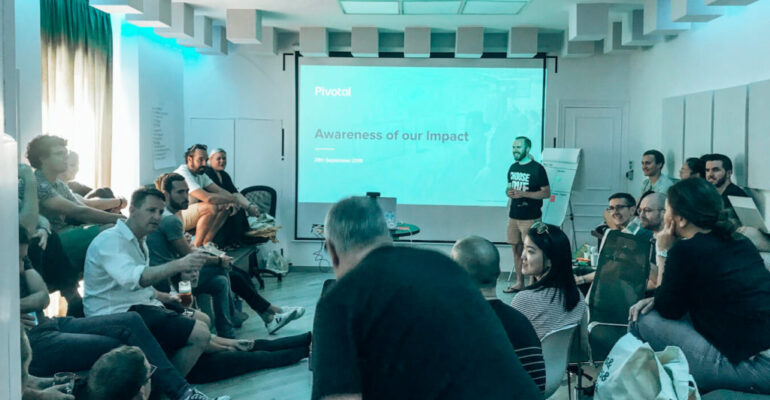Pivotal Product Ownership Workshop in Apium Academy

Pivotal Product Ownership Workshop in Apium Academy
Apium Academy isn’t just an academy of software development courses and workshops in Barcelona. Apium Academy is a space, gathering point where one can learn and share knowledge. Created by and for those who want to continuously grow and improve, who always want more, Apium Academy is the ideal place where to organize meetups, courses, workshops, open spaces, training, coding dojos and all kinds of tech-related events.
Pivotal organized it’s EMEA Product Ownership workshop in Apium Academy, Barcelona
In September we had the privilege to host a Pivotal Product Ownership Workshop in Apium Academy. EMEA Product Owners came to Barcelona to share their knowledge, their experiences and their key highlights of the year.
What is Pivotal?
Well, I guess you all know what is Pivotal, but just in case, let me briefly explain you who they are and what they do.
Pivotal Platform is the proven solution for companies seeking a software-led, digital transformation. Pivotal helps companies to:
- Building customer-centric software and use their modern platform to run all apps on any cloud.
- Build capabilities and instill a process that shows immediate and lasting impact.
- Empower teams to deliver the products your customers need.
- To instill a culture of test-driven development and pair programming.
Pivotal is a mindful contributor to the most important open-source software (OSS) projects: Spring, RabbitMQ, Kubernetes, Cloud Foundry, and more. They take mature OSS and embed it into commercial products that you can trust.
Right now they have:
- 383 Subscription customers
- 2,900+ employees
- 27 global offices
- 135 ISVs integrated with Pivotal Platform
Pivotal Product Ownership Workshop
Of course we couldn’t miss this opportunity and joined some workshops to learn from leading Product Owners on how they do it and what they focus on. They covered many important topics, like:
- “Using “Hills” to align on user value” by Kevin Curley – Product Manager at Pivotal Dublin
He talked about how to align the product team using the Hills format to have meaningful and well written user outcomes to achieve. - “Neuroleadership applied to communication” by Diane Mergui – Senior Product Manager at Pivotal Labs Paris
She detailed some ways our brain works when communicating and how we can use this knowledge to communicate more efficiently, for instance when giving feedback understanding and anticipating the other person’s reactions. - “Ethics / Speculative consequences” by Liam Darmody – Staff Product Manager at Pivotal Labs London
He talked about how can we design a product taking into account its potential ethical consequences and usage. - And many other critical topics like “burnout”, etc.
SCARF Model in Product Ownership
What caught my attention the most was the David Rock’s SCARF Model and I would like to briefly share the key highlights with you.
SCARF stands for the five key “domains” that influence our behavior:
- Status – our relative importance to others.
- Certainty – our ability to predict the future.
- Autonomy – our sense of control over events.
- Relatedness – how safe we feel with others.
- Fairness – how fair we perceive the exchanges between people to be.
The model is based on neuroscience research that implies that these five social domains activate the same threat and reward responses in our brain that we rely on for physical survival.
Feeling threatened blocks our creativity, reduces our ability to solve problems, and makes it harder for us to communicate and collaborate with others. But, when we feel rewarded, our self-confidence soars, we feel empowered, and we want to do a good job.
The SCARF Model can help you to minimize perceived threats, and to maximize the positive feelings generated through reward when working alongside others. Doing this can help us to collaborate better and to provide more effective feedback.
Status
For example, mishandling feedback can threaten someone’s sense of status, and may even cause him or her to become angry and defensive. Instead, you could offer the person the chance to evaluate his own performance first, or try to reframe your feedback in a more positive way.
It is important to learn to appreciate the positive aspects of your talented team – this will help you to get the best from them, and you’ll earn a reputation as a great manager.
Giving your team members regular praise when they perform well, and provide them with opportunities to develop their skills and knowledge really makes a difference. Good strategy would be to give them more responsibility, or involve them in new projects. However, avoid over-promoting them , particularly if they aren’t quite ready, or you may set them up for a fall.
Certainty
When we’re uncertain of something, the orbital frontal cortex of our brains starts to work overtime as it attempts to make sense of the unknown. This can cause us to feel threatened and to lose focus.
To reduce the likelihood of this happening, it is better to break down complex processes into smaller, more understandable chunks. And, to help people to cope better with uncertainty , encourage them to develop their flexibility and resilience. Also, it is important to mention, that the human brain prefers predictability. When we know what to expect, we feel safe. This safety is a reward in itself, and you can maximize it by being clear on what you expect from your team member. It makes team members feel safe in the knowledge that they are on the right track.
Autonomy
Micromanagement is the biggest threat to autonomy. Try to avoid getting too involved with people’s day-to-day work. Instead, show that you trust their judgment by including them in decision-making processes, and be sure to delegate tasks instead of holding onto them.
Encourage your people to become more autonomous by allowing them to take on more responsibility, and to use their initiative. Give them the freedom to try out new ideas.
Relatedness
A lack of relatedness can leave us feeling isolated and lonely. This can reduce creativity, commitment and collaboration.
Work to build up strong team bonds by scheduling in regular one-on-ones , or by organizing a team lunch or team-building event.
Fairness
If someone believes something to be unfair, it will activate his or her insular cortex – the region of the brain that is linked to disgust. This results in a powerful threat response. Minimize the impact of this by being open and honest with the person about what’s going on, and why.
Most importantly, make sure that you treat everyone fairly. Encourage mutual acceptance , and never show favor or exclude people on purpose.
Unfairness will more likely occur where there is a lack of rules, expectations or objectives. Setting up a Team Charter, which clarifies individual goals and roles, team hierarchy, and day-to-day operations, can remedy this. But remember to get your people’s input and approval before you introduce it.
Well, I hope you found it useful!
If you are also interested in organizing your event at Apium Academy, let us know!



